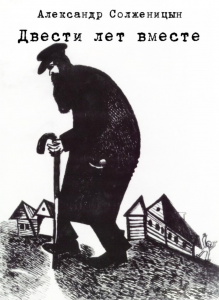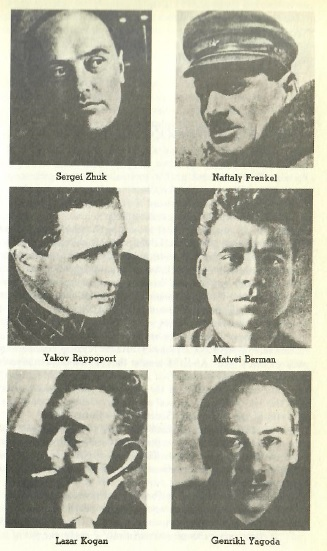The Bloody Red Pill: Solzhenitsyn’s Two Hundred Years Together, Part 5
Spencer J. QuinnPart 1 here, Part 2 here, Part 3 here, Part 4 here
Large numbers of Jews who did not leave after the revolution failed to foresee the bloodthirstiness of the new government, though the persecution, even of socialists, was well underway. The Soviet government was as unjust and cruel then as it was to be in 1937 and 1950. But in the Twenties the bloodlust did not raise alarm or resistance in the wider Jewish population since its force was aimed not at Jewry.
Having contributed greatly to defeating the Whites in the Russian Civil War, many Soviet Jews spent the 1920s consolidating their positions within the Soviet government apparatus. In chapter eighteen of Two Hundred Years Together, Solzhenitsyn, in typical comprehensive fashion, reveals how extensive their dominance during this period really was. He calls upon contemporaneous sources which claim that in 1927 Jews made up nearly twelve percent of the Soviet government in Moscow, twenty-two percent in Ukraine, and over thirty percent in Belorussia. Much of this can be explained by the general enthusiasm many Russian Jews had for the young republic, their large presence in the major cities, and their innate intelligence and talent. This does not, however, explain the active discrimination against Russians that took place during the same time, especially in universities. This also does not explain how Jews in government consistently used their influence to aid other Jews in quasi-official ways or how the law encouraged Jews to register complaints about anti-Semitism. Most insidiously, this does not explain how non-Jews who remarked upon or criticized the disproportionate Jewish presence in government ran the risk of being labeled counter-revolutionary. And counter-revolutionaries, Solzhenitsyn reminds us, could very well come in contact with nine grams of lead.
Despite Jews making up only 5.2 percent of the Communist Party in 1922, Jewish per capita party membership (7.2 percent) was nearly double that of Russians (3.8 percent). In leadership positions among the Communists, however, the Jews truly distinguished themselves. According to Pravda in the same year:
. . . at the 11th Communist Party Congress, Jews made up 14.6 percent of the voting delegates, 18.3 percent of the non-voting delegates, and 26 percent of those elected to the Central Committee at the conference.
Pravda, 1930:
The portrait of the 25-member Presidium of the Communist Party included eleven Russians, eight Jews, three from the Caucasus, and three Latvians.
Solzhenitsyn describes how, in the state security organizations, Jewish membership increased during the 1920s. Three of the four of OGPU director Felix Dzerzhinsky’s assistants were Jews: Genrikh Yagoda, Benjamin Gerson, and M. M. Lutsky. Solzhenitsyn spends several pages describing the careers of people such as Lev Zalin, Leonid Bull, Simeon Schwartz, and the Nakhamkins clan (Hasidim from Gomel who “thirsted for revenge on everyone”). The Soviets staffed their diplomatic delegations largely with Jews — something the Western Europeans could not help but notice. Even among lower-level provincial authorities, Jews were disproportionately represented. As usual, Solzhenitsyn provides pages worth of names.
Of course, the Russian populace began to notice the brilliant success of so many Jews within the government of their barbaric new republic. They noticed the overall Jewish enthusiasm for the USSR. They noted how, as a group, Jews were the only nationality that seemed to enjoy a net benefit from the Revolution. Jews received the best land, the most privileges. They were less likely to be seen waiting in lines. Although there were efforts to suppress Judaism, Zionism, and Jewish culture (as there was with all religions and ethnic identities at the time), the Christians seemed to get the worst of it, with clergy being murdered or sent to gulags by the thousands, and their churches ransacked or destroyed. Solzhenitsyn describes how, in 1918, a Russian Orthodox procession came forth from the Kremlin in Tula in Central Russia and was simply gunned down.
This naturally caused a great deal of anti-Jewish feeling, especially in the countryside. When prominent Jews Leon Trotsky, Grigory Zinoviev, and Lev Kamanev formed their United Opposition against Stalin after Lenin’s death, most of their followers were Jewish. Trotsky fretted how Stalin might use the growing anti-Jewish feelings among the populace against his Jewish rivals. There may have been some truth to this, but Stalin was too politically astute to resort to crass anti-Semitism himself — especially given how numerous Jews were in the Party and how Western opinion and support of the Soviet Union depended much upon its treatment of Jews. As such, his most trusted Jewish allies, Lev Mekhlis, Moses Rukhimovitch, and Lazar Kaganovich never left his side during this time.
Solzhenitsyn also leaves us with this unsubtle nugget:
At the 12th Communist Party Congress (1923), three out of six Politburo members were Jewish. Three out of seven were Jews in the leadership of the Komsomol and in the Presidium of the All-Russia Conference in 1922. This was not tolerable to other leading communists and apparently preparations were begun for an anti-Jewish revolt at the 13th Party Congress (May 1924). There is evidence that a group of members of CK [Central Committee] was planning to drive leading Jews from the Politburo, replacing them with [Viktor] Nogin, [Aleksandr] Troyanovsky, and others, and that only the death of Nogin interrupted the plot. His death, literally on the eve of the Congress, resulted from an unsuccessful and unnecessary operation for a stomach ulcer by the same surgeon who dispatched [Mikhail] Frunze with an equally unneeded operation over a year and a half later.
It should be noted that in 1925 Mikhail Frunze was a rising star among the Soviets and was considered a possible successor to Lenin. Although he also suffered from a stomach ulcer, he said he was in fine health when Stalin pressured him into having this operation. Whether or not the physicians who performed this operation were Jewish remains an open question, but rumors persist among those who preserve Frunze’s memory that they were.
Towards the end of chapter eighteen Solzhenitsyn states unequivocally that Jews could be found throughout the Soviet power structure during the 1920s when that same power structure was stripping freedoms of speech, commerce, and religion from its citizens.

You can buy Spencer J. Quinn’s novel Charity’s Blade here.
The 1930s, which Solzhenitsyn covers in chapter nineteen, was a different beast. This and the following chapter indeed are the bloodiest red pills found in Two Hundred Years Together. Terror famines, the Great Terror, and the worst abuses of the gulag system lay ahead. The “sinister principal executive” behind the mass collectivization which starved millions in Ukraine and other places, was Yakov Yakovlev-Epshtein. For many years this killer was lionized in the Soviet press. Solzhenitsyn lists three of his Jewish collaborators. He discusses Isai Davidovich Berg, the NKVD murderer who invented the mobile gas chamber. He implicates Jews such as M.G. Gerchikov (chairman of the Grain Trust board of directors), M. Kalmanovich, and I. Kleiner for their important roles in Soviet agriculture during the worst months of the Holodomor. Jews also comprised a third to a half of the People’s Commissariats of Trade and Supply during this time. Despite offering the caveat that Jews never populated one hundred percent of these powerful organizations, Solzhenitsyn goes on for pages detailing the Jewish dominance of Soviet economics, diplomacy, culture, and politics during the 1930s. He lists dozens of Jews by name who were victims of Stalin’s purges and describes the list as a “commemoration roster of many top-placed Jews.”
Here is a typical passage from chapter nineteen:
Out of 25 members in the Presidium of the Central Control Commission after the 16th Party Congress (1930), 10 were Jews: A. Solts, “the conscience of the Party” (in the bloodiest years from 1934 to 1938 was assistant to Vyshinsky, the General Prosecutor of the USSR); Z. Belenky (one of the three above-mentioned Belenky brothers); A. Goltsman (who supported Trotsky in the debate on trade unions); ferocious Rozaliya Zemlyachka (Zalkind); M. Kaganovich, another of the brothers; the Chekist Trilisser; the “militant atheist” Yaroslavsky; B. Roizenman; and A.P. Rozengolts, the surviving assistant of Trotsky. If one compares the composition of the party’s Central Committee in the 1920s with that in the early 1930s, he would find that it was almost unchanged — both in 1925 as well as after the 16th Party Congress, Jews comprised around 1/6 of the membership.
In the upper echelons of the communist party after the 17th Congress (“the congress of the victors”) in 1934, Jews remained at 1/6 of the membership of the Central Committee; in the Party Control Commission — around 1/3, and a similar proportion in the Revision Commission of the Central Committee. (It was headed for quite a while by M. Vladimirsky. From 1934 Lazar Kaganovich took the reins of the Central Control Commission). Jews made up the same proportion (1/3) of the members of the Commission of the Soviet Control. For five years filled with upheaval (1934-1939) the deputy General Prosecutor of the USSR was Grigory Leplevsky.
And this was occurring when Stalin was supposedly purging Jews from the Party.
In chapter twenty, Solzhenitsyn returns to his focus on the gulag system. This, understandably, is a short chapter given the vast, three-volume Gulag Archipelago which preceded it. However, Solzhenitsyn focuses on the Jewish Question here in the way he did only tangentially in Gulag. For example, he states that Jews had it easier than non-Jews in the gulag, and that they tended to make up the upper strata in these places. They deliberately looked out for each other and used their influence at the expense of non-Jews. For example, they were known to recruit other Jews for privileged positions among medical staff, even if the recruits had no medical training. Solzhenitsyn, again, spends pages listing Jews by name who used their tribal affiliations to receive unfair advantages in the gulag system — some of whom even had the nerve to complain about it later. He also retells the story of Ane Bernstein, an ethnic Latvian who believed his fortunate name was his ticket to salvation while a zek. He claimed that in all his camps, Jews took him for one of their own and never failed to help him when he needed it.
Solzhenitsyn reserves particular contempt for Lev Inzhir and Naftaly Frenkel. The former was a stool pigeon and false informant who became the chief accountant of the gulag system. Inzhir used his Jewish connections in government shamelessly to improve his position in the camps while presiding over the suffering of untold Russians, Ukrainians, and others. The latter was a successful businessman residing in Constantinople who had escaped Russia before the Revolution. He was no communist. Yet, he returned to the Soviet Union anyway and, as chief manager of the labor force of Belomor Canal, was responsible for the deaths of hundreds of thousands. Both Inzhir and Frenkel were covered extensively in Gulag.
Solzhenitsyn also revisits one of the earliest accusations of anti-Semitism he had to face as an author. In The Gulag Archipelago, he had included photographs of five men — all Jews — who had received Order of Lenin medals for their leadership in the construction of the Belomor. These men were Yagoda (head of the NKVD), Matvei Berman (head of the Gulag system), Lazar Kogan (head of canal construction), Jacob Rapoport (deputy head of construction), and Frenkel. Their photographs had been prominently displayed in a book about the Belomor, which was published shortly after its completion in the early 1930s. For this, many Jews labeled Solzhenitsyn an anti-Semite because he had made it seem as if Jews were disproportionately responsible for the tremendous death toll which had accrued along the banks of the Belomor.
But they were.
Furthermore, Solzhenitsyn mordantly points out how convenient it was for his critics to profess outrage over these crimes only decades after they had been committed. At the time, however — while these atrocities were being committed — nearly all Jewish voices were silent. And most remain so till this day — except when they wish to heap more scorn upon Solzhenitsyn as an anti-Semite.
Again, Solzhenitsyn reveals his extensive research by naming names. By this point in Two Hundred Years Together, he doesn’t even have to call them Jews anymore. The reader just knows:
The head of 1st Department of Belomorstroi was one Wolf; the head of the Dmitrov section of Volgocanal was Bovshover. The finance division of Belomorstroi was headed by L. Berenzon, his deputies were A. Dorfman, the already mentioned Inzhir, Loevetsky, Kagner, Angert. And how many of the other humbler posts remain unmentioned? Is it really reasonable to suppose that Jews were digging soil with shovels and racing their hand-barrows and dying under those barrows from exhaustion and emaciation? Well, view it as you wish. A. P. Skripnikova and D. P. Vitkovsky, who were there, told me that Jews were overrepresented among Idiots [inmates who obtained less demanding positions] during construction of Belomor Canal, and they did not roll barrows and did not die under them.
And you could find highly-placed Jewish commanders not only at BelBaltlag. Construction of the Kotlas-Vorkuta railroad was headed by Moroz (his son married Svetlana Stalina); the special officer-in-charge of Gulag in the Far East was Grach. These are only a few of the names, which resurfaced accidentally. If a former inmate Thomas Sgovio, an American national, didn’t write to me, I wouldn’t be aware about the head of the Chai-Uryinsk Mining Administration on Kolyma between 1943-44 (at the depths of the Patriotic War): “Half-colonel Arm was a tall black-haired Jew with a terrible reputation . . .
The red pills just keep getting redder and redder, don’t they?
If you want to support Counter-Currents, please send us a donation by going to our Entropy page and selecting “send paid chat.” Entropy allows you to donate any amount from $3 and up. All comments will be read and discussed in the next episode of Counter-Currents Radio, which airs every weekend on DLive.
Don’t forget to sign up for the weekly email Counter-Currents Newsletter for exclusive content, offers, and news.
The%20Bloody%20Red%20Pill%3A%20Solzhenitsyn%E2%80%99s%C2%A0Two%20Hundred%20Years%20Together%2C%20Part%205
Enjoyed this article?
Be the first to leave a tip in the jar!
Related
-
Mechanisms of Information Distribution
-
Overturning Roe v. Wade
-
When The Temperate Is Decried as Extreme: A Review of When Harry Became Sally: Responding to the Transgender Moment
-
A Nice Place To Visit: Lovecraft As The Original Midnight Rambler, Part 4
-
Prepping for Kids
-
Pass It On: Vladimir Volkoff’s La Grenade
-
A Nice Place To Visit: Lovecraft As The Original Midnight Rambler, part 3
-
A Nice Place To Visit: Lovecraft as the Original Midnight Rambler-Part 2


2 comments
The “sinister principal executive” behind the mass collectivization which starved millions in Ukraine and other places, was Yakov Yakovlev-Epshtein. For many years this killer was lionized in the Soviet press.
Plus Fhilipp Goloshchyokin, the murderer of Qazaqs, the organizer of “collectivization” in Qazaqstan. How it is at all possible to collectivize nomadic breeders? Only by killing them. Three millions were dead, and it is yet an “optimistic” estimate.
Professor K.M. Abzhanov, Director of the Institute of History and Ethnology who stated that: “Hunger killed at least 3 million Kazakhs. One-sixth of the indigenous population left their historical homeland forever. Of 3.5 million Kazakhs in 1897 accounting for 82% of the region’s population, by 1939 there were only 2.3 million, their share in the population of the republic fell to 38%”. Two Soviet censuses show that the number of the Kazakhs in the Kazakh ASSR dropped from 3,637,612 in 1926 to 2,181,520 in 1937. The actions of the Soviet government made Kazakhs a minority in the Kazakh ASSR, and not until the 1990s did Kazakhs become the largest group in Kazakhstan again.
GW,
Thank you for this. From Robert Conquest’s Harvest of Sorrow I knew that millions of Kazakhs and other central Asians also perished in the terror famines of the 1930s. But the specifics you provide are a great refresher.
Comments are closed.
If you have Paywall access,
simply login first to see your comment auto-approved.
Note on comments privacy & moderation
Your email is never published nor shared.
Comments are moderated. If you don't see your comment, please be patient. If approved, it will appear here soon. Do not post your comment a second time.